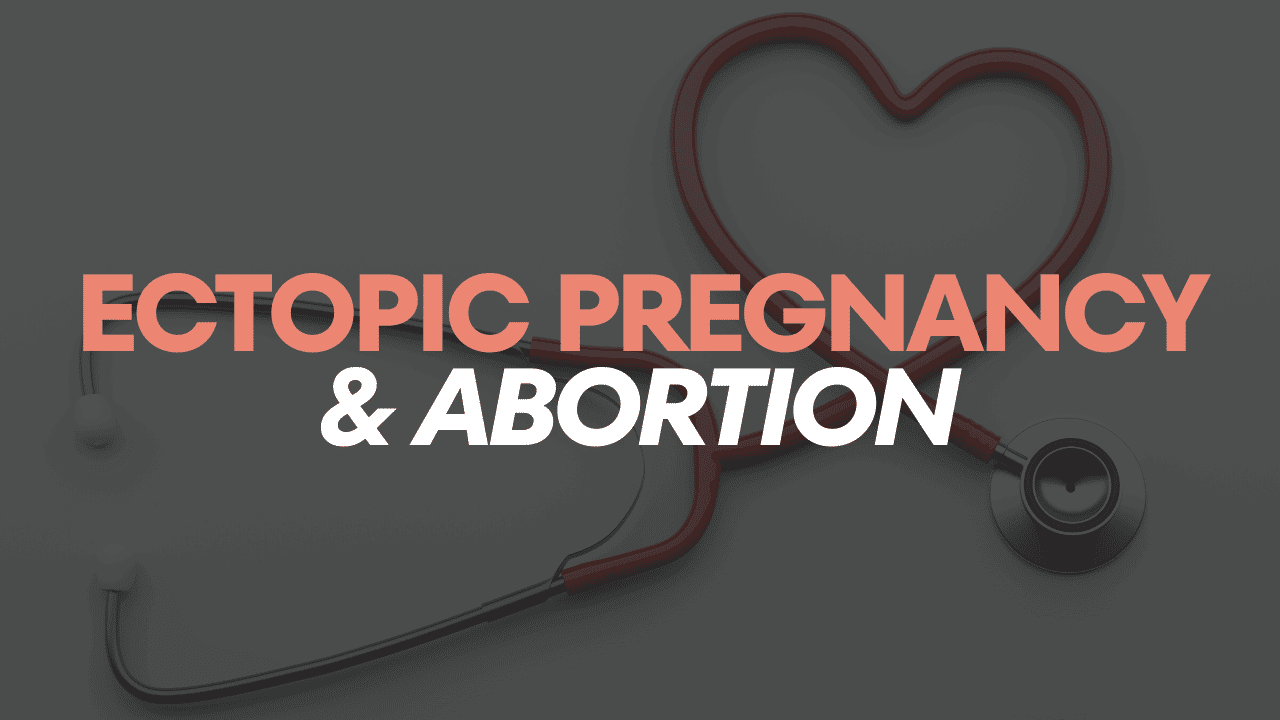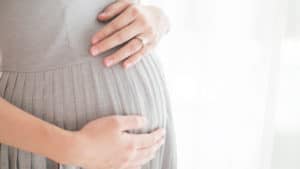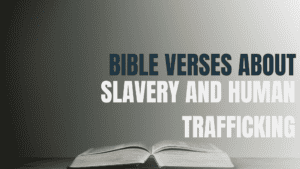There has been much confusion about ectopic pregnancy and abortion, especially after Roe v Wade was overturned. Some news sources said, “People will die.” The idea was that an ectopic pregnancy required an abortion. With the change of laws where some states banned abortion, some believed physicians might not know how the law affects them and would hesitate to remove a life-threatening ectopic pregnancy.
Yet, there have been ectopic pregnancies before all of this confusing dialogue. How were they treated? Did women go to abortion providers for an ectopic pregnancy? Would a doctor be confused about how to treat their patient now that Roe v. Wade is history?
Dr. Christina Francis, a board-certified OB/GYN who currently works as an OB/GYN Hospitalist and has written for several prominent publications, is an associate scholar with the Charlotte Lozier Institute and CEO-Elect of the American Association of Pro-Life Obstetricians and Gynecologists (AAPLOG), among many other notable accomplishments helps us get the facts straight.
Question - Does an ectopic pregnancy require an abortion?
Answer from Dr. Francis
Simply put, no. The treatment for ectopic pregnancy is not at all the same as the procedures used for an abortion. Ectopic pregnancies (most commonly located in the fallopian tube) are typically treated through surgery that either removes the tube or opens the tube and removes the embryo or through a medication that ends the embryo’s growth of the embryo and placenta. In the vast majority of cases, when an ectopic pregnancy is diagnosed, the human embryo is no longer alive.
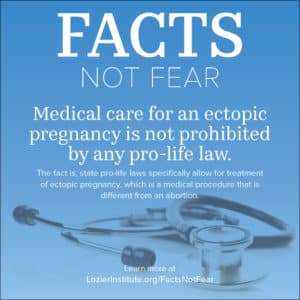
Question – So, the treatment for an ectopic pregnancy is not an abortion?
Answer from Dr. Francis:
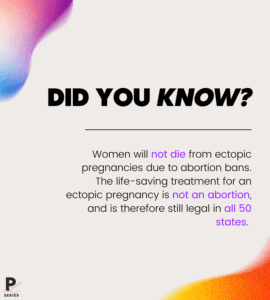
No, abortion is different from the treatment of an ectopic pregnancy. The sole intent of an abortion is to produce a dead baby – that’s why it’s called a “failed abortion” when the baby survives. Treating a pregnancy complication that threatens the mother’s life to save her life, such as ectopic pregnancy, does not intend to cause the death of the preborn child. Our treatment intends to save the life of the mother. As pro-life physicians, we are pro-life for both mother and baby, so the decision is clear – we save who we can.
The difference between this and an elective abortion is that though we understand that a preborn child will tragically lose his life, we don’t intentionally cause his death.
Ethical Principle of Double Effect
The importance of intent is well understood in the ethical principle of double effect. This principle acknowledges that some actions will have both good and bad effects; however, they are morally allowable if they meet the following four conditions:
- The nature of the act. The action itself must not be intrinsically wrong; it must be a good or at least morally neutral act.
- The agent’s intention. The agent intends only the good effect, not the bad effect, even though it is foreseen.
- The distinction between means and effects. The bad effect must not be the means of the good effect.
- Proportionality between the good effect and the bad effect. The good effect must outweigh the evil that is permitted, in other words, the bad effect.
Perfect Love Series Video
Equip yourself with more logic and love for effective and healing pro-life conversations. Check out I Am ProLife’s Perfect Love Campaign.
Question – What are the signs and symptoms of an ectopic pregnancy?
Answer from Dr. Francis:
An ectopic pregnancy occurs when the human embryo implants somewhere outside the uterine cavity – most commonly in the fallopian tube. This is a problem because the uterine cavity is the only place that can sustain a growing preborn child but also expand appropriately as that child grows. When the embryo outgrows the tube’s ability to expand, it causes the tube to rupture, leading to potentially life-threatening bleeding inside the mother’s abdomen. This is still the leading cause of maternal mortality in the first trimester in the United States. Women experience symptoms such as vaginal bleeding and abdominal or pelvic pain.
Question – Will women die without abortion because of an ectopic pregnancy?
Answer from Dr. Francis
Ectopic pregnancies are potentially life-threatening, though they don’t need to be if they are diagnosed and treated expeditiously. These treatments are not abortions and are not defined as such either by the medical community or by the law. In fact, there is not a single state law that restricts abortion that impedes, in any way, a physician’s ability to treat an ectopic pregnancy.
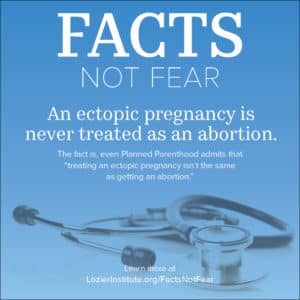
A Physician Can Treat an Ectopic Pregnancy
“A Charlotte Lozier Institute legal and medical analysis shows that all 23 states with strong pro-life laws currently on the books allow necessary and timely medical treatment for miscarriage, ectopic pregnancy, and other procedures necessary to save the life of a pregnant woman.”
“A plain reading of any of these statutes easily refutes the false and dangerous misinformation being spread by pro-abortion activists. Further, none of these laws prohibit a medical professional from acting as necessary when facing a life-threatening medical emergency. To claim otherwise is either ignorance of the law or willful misrepresentation at the expense of women and their unborn children who deserve to be treated with dignity and respect.”
Mary E. Harned, J.D., a CLI legal scholar who previously served as an Investigative Counsel with the Select Investigative Panel of the U.S. House Energy and Commerce Committee
Question - Are you concerend about the abortion pill and ectopic pregnancy?
Answer from Dr. Francis:
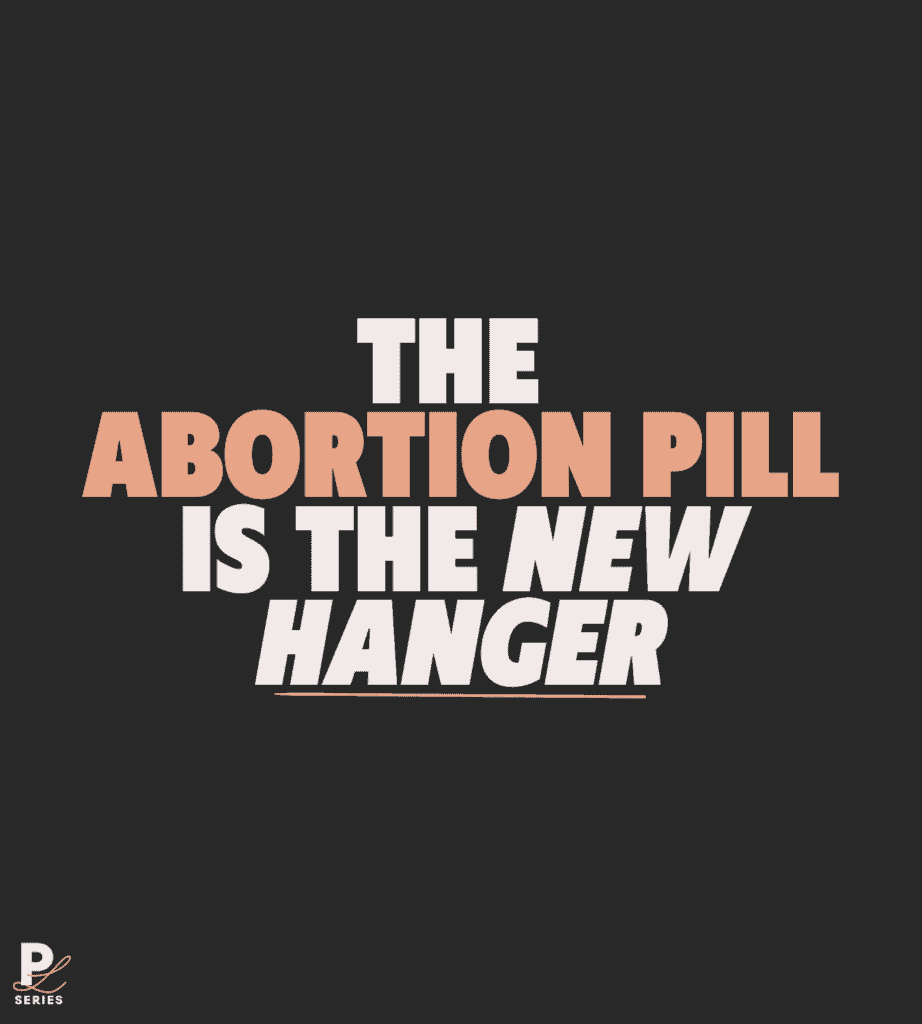
Yes. What will lead to more deaths from ectopic pregnancy is the push by the abortion industry and its allies for women to obtain abortion pills without an in-person visit with a physician and without appropriate screening for an ectopic pregnancy, which occurs in 1 in 50 pregnancies in the U.S. It should be noted that this push began long before the Dobbs decision, that overturned Roe v. Wade, and was aided by the FDA removing key safety provisions on this drug in December 2021 and worsened by their recent decision to allow these drugs to be dispensed in pharmacies and through the mail.
The danger with women not being screened before taking the chemical abortion drugs is that the symptoms of a chemical abortion are very similar to those of an ectopic pregnancy – vaginal bleeding and abdominal pain. And so valuable time is lost while women stay at home with these symptoms, thinking they’re typical for the abortion process, when in fact they have an ectopic pregnancy that is rupturing and causing life-threatening internal bleeding – time that could be the difference between life and death.
Additional Information:
Conclusion
There have been a lot of misleading statements made about ectopic pregnancy. We all have been alarmed by the thought that a woman may die. Thankfully, that is not the case when properly cared for. Doctors treating ectopic pregnancies before Roe v Wade will continue to treat ectopic pregnancies. Abortion facilities do not treat ectopic pregnancies, so the narrative that abortion is needed to save a woman’s life is false. Rather, women deserve accurate information and excellent healthcare that does not involve the intentional ending of a human life. Women should rest assured that they will still be able to receive that excellent healthcare regardless of a state’s laws on abortion.









